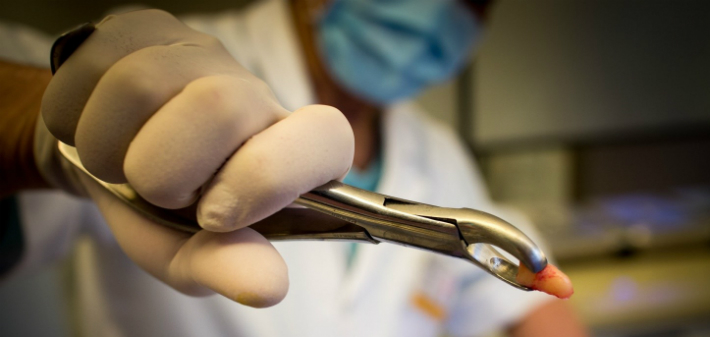If you experience symptoms of tooth pain, crowding, or infection, you may need a tooth extraction.
While undergoing oral surgery can be painful, knowing what to expect before, during, and after can help speed up your recovery. Choose an experienced dentist in Little Rock who will make the process as smooth as possible so your tooth extraction is a success.
How Can I Prepare for a Tooth Extraction?
To help you prepare for your tooth extraction surgery, your dentist will ask you to avoid eating or drinking anything eight hours prior to your appointment. Do not take certain medications, as instructed by your dentist, to avoid potential complications with the anesthesia. Plan for someone to drive you home after your surgery, as you will still be under the effects of anesthesia for several hours.
What to Expect During Tooth Extraction Surgery
The exact steps involved in a tooth extraction can vary depending on your condition. A pulp infection usually requires more intensive cleansing while broken or cracked teeth may call for more bone removal. In general, the tooth extraction process typically follows these steps:
- An initial X-ray of the area is taken to plan the safest removal.
- A local sedative or general anesthesia is administered, depending on your needs.
- An incision is made in the gum tissue and any obstructing bone is drilled away so that your oral surgeon can access the root of the tooth.
- The tooth is cut it into sections if necessary, and forceps are used to carefully remove the tooth from its socket.
- Any leftover pieces of tooth are cleaned and removed from the extraction site.
- The opening is either stitched together or covered with gauze. This minimizes bleeding and forms a blood clot to promote healing.
How to Care For Your Mouth After a Tooth Extraction
After your tooth is pulled, your dentist will give you specific post-surgery care instructions. It is important that your follow these instructions to avoid infections or excess bleeding. If you experience minor bleeding the next day, you will be instructed to replace gauze every few hours until the bleeding stops. Your dentist may also prescribe pain medication and recommend using an ice pack for additional pain relief. Bruises and swelling should decrease within two to three days.
During the first 24 hours post-surgery, you will be advised to drink plenty of water and eat foods that require little to no chewing, such as soup, pudding, yogurt, or fruit sauce. At this stage, it is important to avoid eating any hot, salty, or spicy foods or drinking caffeine, soft drinks, or alcohol, as these can prolong the healing process and aggravate the wound. Avoid brushing your teeth for 24 hours after the procedure and continue to rinse your mouth with a warm saltwater solution after every meal for the following two weeks.
Strenuous physical activity should be avoided for at least 24 hours after your surgery. If your pain and swelling do not decrease you may need to rest longer. Depending on the nature of your surgery, full recovery can take several weeks to a month.
What Possible Complications Can Occur Post-Extraction?
While most people recover from a tooth extraction without experiencing any major issues, complications can occur if you get an infection or experience nerve damage. Contact your dentist immediately if you experience any of the following symptoms:
- Severe and worsening pain or swelling that is unresponsive to pain medication
- A strange lingering taste in your mouth
- Prolonged numbness
- Pus in the tooth socket or your nasal passages
- Excess bleeding
- Trouble swallowing or breathing
If you are experiencing tooth pain and need a tooth extracted, contact Arkansas Family Dental at 501.683.8886 to schedule an appointment. Our dental staff in Little Rock will be happy to assess your dental needs and walk you through the process of a tooth extraction.


Leave a Reply